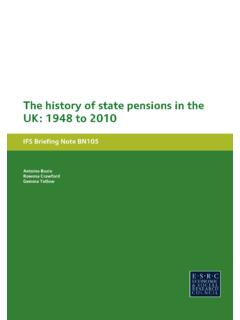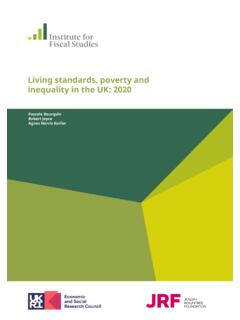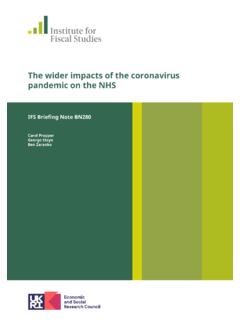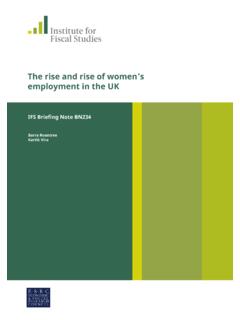Transcription of Inequalities in education, skills, and incomes in the UK ...
1 An IFS initiative funded by the Nuffield FoundationInequalities in education, skills, and incomes in the UK: The implications of the COVID-19 pandemicRichard BlundellJonathan CribbSandra McNallyRoss WarwickXiaowei Xu Inequalities in education, skills, and incomes in the UK: The implications of the COVID-19 pandemic Richard Blundell Jonathan Cribb Sandra McNally Ross Warwick Xiaowei Xu Copy-edited by Rachel Lumpkin Published by The Institute for Fiscal Studies ISBN 978-1- 80103-027-4 An IFS-Deaton Review of Inequalities initiative funded by the Nuffield Foundation This report was funded by a Covid and Society grant from the British Academy and was part of the evidence-base for the British Academy Report: Covid and Society. Co-funding from the ESRC-funded Centre for the Microeconomic Analysis of Public Policy (ES/M010147/1) and from the Nuffield Foundation is gratefully acknowledged.
2 We are grateful for thoughts and comments from Christine Farquharson and Robert Joyce. The Nuffield Foundation is an independent charitable trust with a mission to advance social well-being. It funds research that informs social policy, primarily in Education, Welfare, and Justice. It also funds student programmes that provide opportunities for young people to develop skills in quantitative and scientific methods. The Nuffield Foundation is the founder and co-funder of the Nuffield Council on Bioethics and the Ada Lovelace Institute. The Foundation has funded this project, but the views expressed are those of the authors and not necessarily the Foundation. Visit Inequalities in education, skills, and incomes in the UK: The implications of the COVID-19 pandemic 2 Institute for Fiscal Studies Executive summary The changes that British society and the economy have experienced since the start of the Covid-19 pandemic are some of the most unexpected and profound seen since World War II.
3 This report seeks to set out the potential effects of the Covid-19 pandemic on Inequalities in the UK. The pandemic has affected Inequalities in education, training, wages, employment and health, including how these vary by gender, ethnicity, and across generations. It has also opened up new gaps along dimensions that were not previously widely considered, such as the ability to work at home. In this briefing note, we focus on two types of Inequalities : first, Inequalities in education and skills; second, Inequalities in the labour market and household incomes . For each of these broad areas we highlight the challenges posed by Inequalities between different groups and the opportunity for an integrated policy response. We examine Inequalities in education and skills by gender, ethnicity, region and between people from different socio- economic backgrounds.
4 In our analysis of inequality in labour markets and household incomes , we examine inequality across the income distribution, and again consider Inequalities between the aforementioned groups. We find evidence that three particular Inequalities are likely to have risen because of the crisis: income Inequalities between richer and poorer households, socio- economic Inequalities in education and skills, and intergenerational Inequalities between older and younger people. The key drivers of these are the fall in employment resulting from the pandemic, which fall harder on younger and less well-educated people, and the massive decline in face-to-face learning that school children have faced. We discuss opportunities for an integrated policy response to these interrelated problems. Key findings Prior to the Covid-19 pandemic, a range of economic Inequalities had become more salient.
5 Income inequality was higher than in most other developed countries. The gender pay gap had stopped falling. There were large differences in the prosperity of different groups in society (such as between people of different ethnicities) and between different regions. Educational performance also varied significantly based on socio- economic backgrounds and paths into good jobs were much less clear for those not going to university. The Covid-19 pandemic and the public health response to it have radically changed life in the UK. There are two particular trends that have been responsible for changes to Inequalities in education, skills, and incomes . First, the shutting down of many sectors of the economy during in lockdowns and social distancing measures have led to stark changes in the labour market. Second, the lack of face-to-face teaching in Spring 2020 and again in early 2021 has massively disrupted the education of all children.
6 Institute for Fiscal Studies 3 The immediate effects of the pandemic are particularly likely to increase three types of Inequalities : income inequality, socio- economic Inequalities in education and skills, and intergenerational Inequalities . Income inequality is likely to be pushed up by higher rates of unemployment and underemployment, which will leave more families reliant on benefits. The huge disruption to schooling has affected all children, particularly those from poorer families, with long-term effects on their educational progression and labour market performance. Younger generations have experienced disrupted education and they face a tougher labour market than that seen prior to the pandemic. The effects on Inequalities between the genders, regions, and people of different ethnicities are more mixed.
7 In the longer run, we identify factors that are important for Inequalities that have been brought about or accelerated by the pandemic. One is a further shift towards online retail instead of in-store purchases. Another is the potential for increasing numbers of office-based jobs to be undertaken at home or remotely at least part-time. This could have implications for people s location decisions, their ability to search for and find work. In addition, changed expectations about the probability of future pandemics could change people s and firms investment decisions. We consider a number of possible policy options for a government concerned about the inequality implications of rising unemployment and disrupted schooling. Most of these options would require higher public expenditure or lower taxes that would need to be funded by more borrowing, raising (other) taxes, or cuts to public expenditure elsewhere.
8 Potential options to address the effects of rising unemployment that we consider include: reducing the cost of employing people using the tax system; raising public service expenditure and public sector employment; increased funding of (re-)training programmes; welfare reforms to lessen conditionality ; boosting out of work benefits; or more fundamental changes to introduce more social insurance into the welfare system. Options for addressing the challenges from missed schooling include: higher funding of remedial tuition; extending the school day or year; increasing use of technology in education; greater funding and flexibility in vocational education; and greater government support for apprenticeships. We suggest that policies directed at employment, training and welfare should be considered alongside each other so as to explicitly consider spillovers and to ensure that goals are aligned.
9 Inequalities in education, skills, and incomes in the UK: The implications of the COVID-19 pandemic 4 Institute for Fiscal Studies 1. Introduction The changes that British society and the economy have experienced since the start of the Covid-19 pandemic are some of the most unexpected and profound seen since World War II. In addition to critical public health challenges , the government has had to respond to the huge economic and social changes as a result of social distancing and other policies aimed at reducing transmission of Covid-19. This includes the furloughing of millions of workers, huge numbers of businesses that are unable to operate at all, and the cancellation of face-to-face teaching at schools, colleges, and universities for most young people between March and September 2020, and again in early 2021.
10 And people s daily lives are changing radically. For most white-collar jobs, work has been undertaken from home rather than in an office. Shopping has been increasingly done online rather than in store. The withdrawal of government support is expected to trigger a rise in unemployment that will affect people across the country. In this briefing note, we set out the potential effects of the Covid-19 pandemic on Inequalities in the UK. Prior to the pandemic, there were already large differences in the economic outcomes of richer and poorer people, between different groups in society, and between different parts of the country. We argue that the nature of these pre-existing Inequalities is key to understanding the longer-term impact of Covid-19. The pandemic has affected Inequalities in education, training, wages, employment, health, gender, ethnicity, and across generations.










